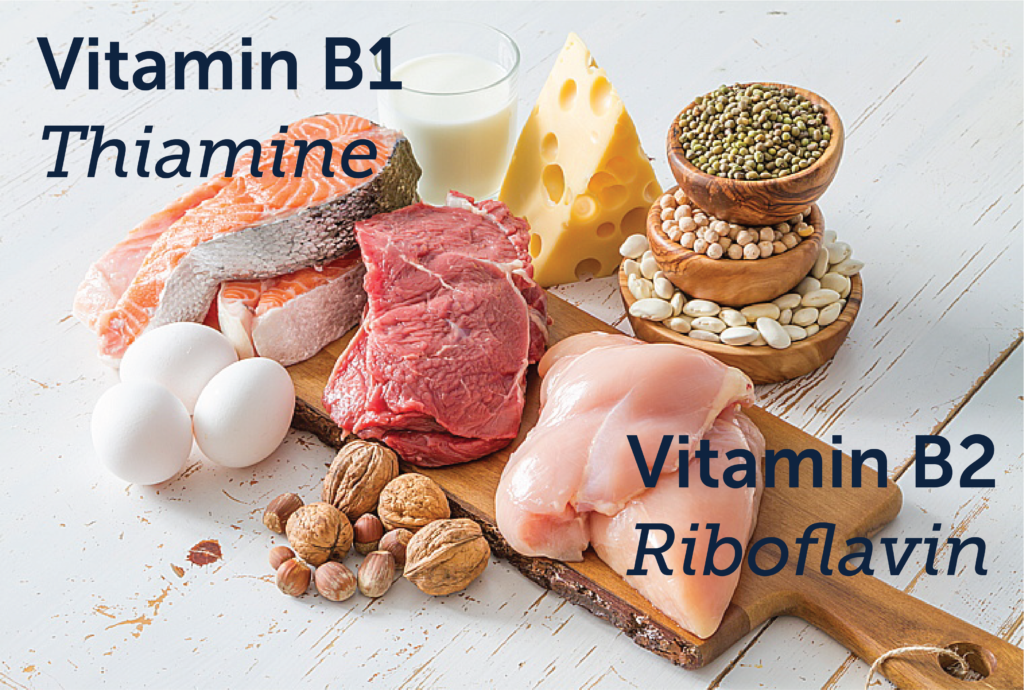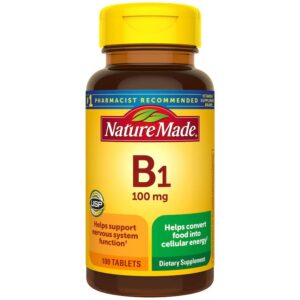Thiamine (B1) and Riboflavin (B2) and Migraine Headaches
Let’s look at two more important B vitamins. We’ve discussed B12 and B9. Turns out your body relies on 6 more B vitamins. Let’s take some time to understand what thiamine (B1) and riboflavin (B2) mean to your health.
 B vitamins were the second group of vitamins discovered after, you guessed it, vitamin A. All B vitamins have a couple of things in common—they are water soluble, and they function as coenzymes. A coenzyme combines with an enzyme to enable it to do its job. An enzyme without a coenzyme is like a car without wheels. And the fact that B vitamins are water soluble means you can’t store them, you need to consume them on a regular basis; and if you consume too many, you will pee them out.
B vitamins were the second group of vitamins discovered after, you guessed it, vitamin A. All B vitamins have a couple of things in common—they are water soluble, and they function as coenzymes. A coenzyme combines with an enzyme to enable it to do its job. An enzyme without a coenzyme is like a car without wheels. And the fact that B vitamins are water soluble means you can’t store them, you need to consume them on a regular basis; and if you consume too many, you will pee them out.
Most people assume they get enough B vitamins from the meat they eat, and that’s usually the case. But several things can cause deficiencies that affect our health in some unsuspecting ways. So, here’s what you need to know about two of the “other B vitamins.”
Vitamin B1 (Thiamine)
Thiamine was the first vitamin identified in the early 1900s. It’s a coenzyme used to produce ATP, the energy currency of the body. It also plays a key role in nerve cell membranes.
Signs of Thiamine Deficiency
Beriberi is the classic thiamine deficiency disease. The word Beriberi means extreme weakness, which is the first symptom of the disease. There are two major types of Beriberi:
- Wet Beriberi, which affects the cardiovascular system. Symptoms of wet Beriberi include increased heart rate, shortness of breath, and swelling of the lower legs.
- Dry Beriberi, which affects the nervous system. Symptoms of dry Beriberi include difficulty walking, loss of feeling in the hands and/or feet, paralysis of the lower legs, mental confusion, speech difficulty, pain, and/or vomiting.
Alcohol abuse leads to a severe form of thiamine deficiency, Wernicke-Korsakoff Syndrome. Alcohol impairs absorption of thiamine from the digestive tract and increases its excretion in the urine. The syndrome is characterized by symptoms you would expect to see in alcohol abuse: apathy, irritability, mental confusion, disorientation, memory loss, jerky eye movements, and a staggering gate. The syndrome usually responds quickly to an injection of thiamine, but for some people, the symptoms can be irreversible.
Causes of Thiamine Deficiency
Just before 1900, an observant physician working in a prison in East Asia discovered that proper nutrition could cure Beriberi. He noticed the chickens in the prison developed a stiffness and weakness like that of the prisoners who had Beriberi. Prison workers fed the chickens leftover white rice from the prisoners’ plates. But the chickens’ paralysis disappeared when workers began feeding the chickens rice bran, which until then had been thrown in the trash. The same thing happened when prison workers fed the rice bran to the prisoners. Several years later, scientists learned the miracle ingredient—thiamine.
Beriberi and thiamine deficiency are rare in the United States because many foods contain or are enriched with thiamine. If you eat a normal healthy diet, you should get enough. But some people have a risk for thiamine deficiency:
- Dialysis patients
- People taking high doses of diuretics (a common treatment for high blood pressure)
- Heavy drinkers
Sources of Thiamine
Most people think of whole grains or enriched grain flours as the best source of thiamine. It worked for the chickens. But us Simple 9© folks don’t like grains. The thing most people don’t know: pork represents the single best source of thiamine. A few other great sources of thiamine include:
- Fish
- Seeds (especially sunflower)
- Green peas
- Beans
- Spinach
- Yogurt
Recommended Thiamine Intake
Men need about 1.2 mg of thiamine per day, and women need 1.1 mg (1.4 when pregnant or breastfeeding). You can safely take high-dose thiamine (300 mg/day), and doctors often prescribe it to improve glucose tolerance, fatigue after stroke, fatigue in multiple sclerosis, and fatigue in inflammatory bowel disease. In young women with adequate thiamine levels, 50 mg/day improved their reaction time.
Vitamin B2 (Riboflavin)
Riboflavin also plays a role in the energy metabolism of all cells. It helps other B vitamins like folate, thiamine, and B12 do their jobs.
Signs of Riboflavin Deficiency
- Cracking skin at the corners of the mouth
- Swollen red tongue
- Sore throat
- Sensitivity of eyes to light
- Low niacin (B3), riboflavin converts tryptophan to niacin
Causes of Riboflavin Deficiency
Riboflavin deficiency most often appears in children who don’t get enough milk and meat, and in vegans who don’t drink milk.
Sources of Riboflavin
Riboflavin deficiencies are actually extremely rare in the United States because we find it in so many different kinds of foods like dairy, meats, nuts, eggs, and green vegetables. The best sources include dairy and meat.
Another interesting fact about riboflavin—ordinary light can destroy it. For this reason, we buy milk in cardboard or opaque plastic containers. However, it’s not sensitive to heat, so cooking doesn’t destroy it.
Men need 1.3 mg of riboflavin per day, and women need 1.2 mg/day. If you take a vitamin that contains more riboflavin than you need, your body easily excretes it in the urine, turning it yellow.
Riboflavin and Migraines
Scientists believe mitochondrial dysfunction plays a role in some types of migraines. Because proper mitochondrial function requires riboflavin, researchers are studying the potential use of riboflavin to prevent and treat migraine headaches.
In a randomized trial of 55 adults, riboflavin supplementation of 400 mg/day reduced frequency of migraine attacks by two per month compared to placebo. In a study of 41 children, 200 or 400 mg/day riboflavin for 3 to 6 months significantly reduced the frequency and intensity of migraines during treatment. The beneficial effects lasted throughout the 1.5-year follow up period after treatment ended.
Two other studies in children found that 50 to 200 mg/day of riboflavin did not reduce the number of migraine headaches or headache severity. Based on these studies it appears effective treatment of migraines with riboflavin begins around 400 mg/day. That’s a lot when you consider most B Complex vitamins contain 50 mg of riboflavin, and most riboflavin supplements contain 100 mg. But if you experience migraines on a regular basis, you might consider trying higher doses of riboflavin supplements since there are no reported risks or adverse side effects from high riboflavin intakes.
Key Vitamin B Takeaways
As we learn more about B vitamins, we can see a few common themes:
- Eating 2 servings of fresh fruit, 4 servings of vegetables (including a daily bowl of leafy greens), and 3 servings of meat every day will typically cover most vitamin needs for most people.
- People who take medications on a regular basis, people over 60, and people who drink a lot are at risk for various types of vitamin deviancies.
- If you have any sort of vitamin deficiency symptom (which could be any symptom), have your vitamin levels checked before you go on some sort of medication.
So, eat a good amount of plants and meats, drink your water, walk a lot, and strength train really hard once a week. And if you experience migraines, you might want to load up on riboflavin.
Stay Strong,
Bo Railey



